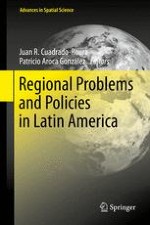2013 | OriginalPaper | Buchkapitel
16. Education, Innovation and Economic Growth in Latin America
verfasst von : Miguel Ángel Mendoza-González, Marcos Valdivia-López, Jorge Isaac-Egurrola
Erschienen in: Regional Problems and Policies in Latin America
Verlag: Springer Berlin Heidelberg
Aktivieren Sie unsere intelligente Suche, um passende Fachinhalte oder Patente zu finden.
Wählen Sie Textabschnitte aus um mit Künstlicher Intelligenz passenden Patente zu finden. powered by
Markieren Sie Textabschnitte, um KI-gestützt weitere passende Inhalte zu finden. powered by
